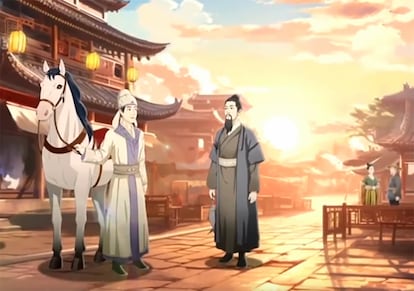Artificial intelligence (AI) needs to train before it can act. In that it is also similar to the brain. And yet, their learning does not stop generating confrontations with human beings. Thousands of artists have long accused new technology of phagocytizing their works without authorization or compensation, to draw, film or write like them. There are already complaints in court. Some creators demand at least a payment for copyright. But others do not want to contribute in any way to improving with their work what they consider a thief and a potential rival in the market. And between both positions, the advance of AI and the possible positive and negative impacts, there is a draft Royal Decree from the Ministry of Culture that wants to protect the authors, but has also set off alarm bells for some. So much so that yesterday, Monday, the final deadline for public contributions, they conveyed their concern by email to the department headed by Ernest Urtasun.
The initiative aims to introduce collective copyright licenses into Spanish law for “the development of general-use artificial intelligence models.” On the one hand, the so-called generative AI (which is capable of accumulating a lot of complex information to generate new content) is fed by thousands of works at the same time. On the other hand, the creators deserve fair compensation, according to the Ministry. And, finally, “obtaining the corresponding authorizations individually is excessively onerous and practically unfeasible, to the point that obtaining the necessary license becomes unlikely,” states the text of the project.
Hence, Culture seeks to create the option for collective management entities to “grant, under certain assumptions, non-exclusive authorizations for the exploitation of works and services on behalf of the rights holders, regardless of whether or not they have authorized the rights holders.” the entity to do so, that is, in the absence of express authorization from all of them.” The document itself recalls that European directive 2019/790 offered EU Member States to implement this possibility. And that is already applied in other countries. A source from the ministry also emphasizes: “The project is still in a very preliminary phase, a public hearing. The intention is for it to be approved with the consensus of the sector.”
“I imagine it was made with good intentions, but it is a mistake that will only benefit large technology companies and will only make the work of artists working in this country even more precarious,” responded Álvaro Ortiz. , one of the best-known cartoonists in Spain, in his contribution to the project, which he shared on the Bluesky social network. Precisely through messages on that and other platforms, several artists expressed their fears and tried to encourage other professionals in the sector to do the same. A few days ago, the first study on the possible economic impact on the arts of generative AI if its advance is not regulated – commissioned by Cisac, the global organization that brings together the main copyright management entities – estimated that the sector musical and audiovisual are at risk of losing, respectively, a quarter and a fifth of their global income by 2028. The Culture project, in reality, precisely wants to put law in the Wild West. The how, however, generates opinions for and against.
“You intend that my creations, those of many other colleagues, serve to feed a technological machinery that will leave me, precisely, without the little work that I can do,” another cartoonist, El Torres, wrote in his email to Culture. The artist David López or the publishing house Grafito, among others, were also critical. Even with the starting point itself.
The project assumes that generative AI is already here, it is here to stay and it will go further. The text also refers to the “adequate development of artificial intelligence systems (…) that can be strategic for our country.” The project argues that the obligation for technology companies that intend to nurture their generative AI to request authorizations author by author would generate “a significant obstacle” to this. And, at the same time, Culture maintains that “many rights holders would be willing and even wish to authorize these uses of their works and benefits as long as they were covered by a license.” There are even artists who take advantage of generative AI as an ally for their creations. The Prisa group, publisher of this newspaper, announced last March a collaboration with OpenAI, the best-known, admired and feared company in the field of AI, responsible for ChatGPT. In the words of a Culture source, “we are talking about something that is already real and happening. “We want to regulate it for the benefit of creators.”
But critical authors believe the opposite: they do not feel sufficiently defended and would like the ministry’s vision to start from a stronger opposition to AI, as when Culture committed to not awarding or contracting works created entirely with artificial intelligence. On October 22, Minister Urtasun wrote in And the project itself includes, throughout its 10 pages, the concerns of the cultural sector regarding the unregulated use of its works.
That is also why the Culture text establishes a few nuances. The collective license may be given only when “the obtaining by users of authorizations from the holders of intellectual property rights individually is so onerous and difficult that it makes the required operation unlikely” and “all rights holders are guaranteed equality of treatment in relation to the terms of the non-exclusive authorization”, among other conditions. At the same time, management entities that are interested in taking advantage of this option must allow “rightholders who have not authorized the granting of non-exclusive authorization to exclude their protected works or features from the extended collective license, at any time, easily and effectively.” But none of that is enough for Ortiz. “I hope you reconsider,” concludes his email to Culture. For now, once the public contribution period has closed, the process continues. The debate, too.

